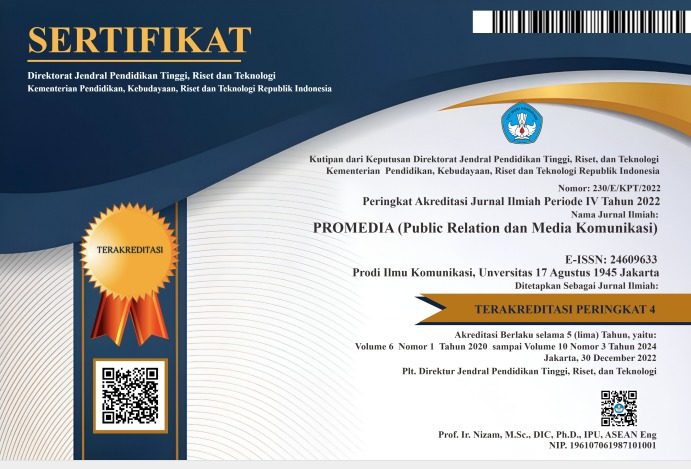A Phenomenological Exploration of AI's Impact in the Digital Communication Ecosystem
Abstract
Communication technology in the digital era has led to the expanding use of Artificial Intelligence (AI), which raises ethical concerns and possible benefits. This research examines the complex world of digital communication, focusing on ethics in the AI era. The central tension is between free expression and lowering the risks of spreading misinformation and deception. The idea is to establish ethical frameworks that maintain this hazardous balance. A phenomenological research technique is used to understand digital communication enthusiasts' lived experiences and viewpoints. Phenomenology gives a qualitative view of ethical challenges and possibilities, encapsulating the underlying character of AI-powered communication tool user interactions to examine the contradiction between free expression and hoax prevention to understand the formulation and usage of ethical norms for responsible communication in the AI era. The theoretical framework shows how AI affects digital communication practices. AI's ability to falsify information poses freedom of speech concerns, prompting an ethical assessment of these technologies. The study explores the potential and moral conundrums that arise from the nexus of communication, AI, and the digital world. It also discusses how the changing digital landscape affects communication ethics. It calls for the development of strong norms and processes to promote ethical digital communication practices, emphasizing the significance of ethical enforcement in its discussion. It explores the ways artificial intelligence (AI) may enrich the digital age by preventing misinformation while preserving freedom of speech. Proposing an enforcement ethic, the study aims to cultivate a digital ecosystem that prioritizes ethics and harnesses the transformative potential of AI.
Full Text:
PDFReferences
Barocas, S., & Selbst, A. D. (2016). Big Data’s Disparate Impact. SSRN Electronic Journal. https://doi.org/10.2139/ssrn.2477899
Creswell, J. W., & Poth, C. N. (2018). Qualitative inquiry & research design: Choosing among five approaches (Fourth edition). SAGE.
Denning, S. (2020, August 2). Why Big Tech Should Regulate Itself. Forbes. https://www.forbes.com/sites/stevedenning/2020/08/02/why-big-tech-should-regulate-itself/
Farkas, J. (2023). Fake News in Metajournalistic Discourse. Journalism Studies, 24(4), 423–441. https://doi.org/10.1080/1461670X.2023.2167106
Finlay, L. (2009). Debating Phenomenological Research Methods. Phenomenology & Practice, 3(1). https://doi.org/10.29173/pandpr19818
Flick, U. (Ed.). (2018). The Sage Handbook of Qualitative Data Collection. Sage Reference.
Floridi, L. (2023). The Ethics of Artificial Intelligence: Principles, Challenges, and Opportunities (1st ed.). Oxford University PressOxford. https://doi.org/10.1093/oso/9780198883098.001.0001
Floridi, L., Cowls, J., Beltrametti, M., Chatila, R., Chazerand, P., Dignum, V., Luetge, C., Madelin, R., Pagallo, U., Rossi, F., Schafer, B., Valcke, P., & Vayena, E. (2018). AI4People—An Ethical Framework for a Good AI Society: Opportunities, Risks, Principles, and Recommendations. Minds and Machines, 28(4), 689–707. https://doi.org/10.1007/s11023-018-9482-5
Fox, J. (2020). ‘Fake News’ – the Perfect Storm: Historical Perspectives*. Historical Research, 93(259), 172–187. https://doi.org/10.1093/hisres/htz011
Fuchs, C. (2020). Nationalism on the Internet: Critical theory and ideology in the age of social media and fake news. Routledge.
Giorgi, A. (2009). The Descriptive Phenomenological Method in Psychology: A Modified Husserlian Approach. Duquesne University press.
Kralik, D. (2005). Reflexivity: A Practical Guide for Researchers in Health and Social Sciences. Journal of Advanced Nursing, 50(2), 227–227. https://doi.org/10.1111/j.1365-2648.2005.03416_2.x
Lazer, D. M. J., Baum, M. A., Benkler, Y., Berinsky, A. J., Greenhill, K. M., Menczer, F., Metzger, M. J., Nyhan, B., Pennycook, G., Rothschild, D., Schudson, M., Sloman, S. A., Sunstein, C. R., Thorson, E. A., Watts, D. J., & Zittrain, J. L. (2018). The Science of Fake News. Science, 359(6380), 1094–1096. https://doi.org/10.1126/science.aao2998
Levin, B., & Downes, L. (2023, May 19). Who Is Going to Regulate AI? Harvard Business Review. https://hbr.org/2023/05/who-is-going-to-regulate-ai
Lindén, C.-G. (2020). Automating the News: How Algorithms are Rewriting the Media. Mass Communication and Society, 23(6), 968–970. https://doi.org/10.1080/15205436.2020.1783887
McNamee, R. (2020, July 29). Big Tech Needs To Be Regulated. Here Are 4 Ways to Curb Disinformation and Protect Our Privacy. TIME. https://time.com/5872868/big-tech-regulated-here-is-4-ways/
Mittelstadt, B. D., Allo, P., Taddeo, M., Wachter, S., & Floridi, L. (2016). The Ethics of Algorithms: Mapping the Debate. Big Data & Society, 3(2), 205395171667967. https://doi.org/10.1177/2053951716679679
Moustakas, C. E. (2009). Phenomenological Research Methods (Nachdr.). Sage.
Naitali, A., Ridouani, M., Salahdine, F., & Kaabouch, N. (2023). Deepfake Attacks: Generation, Detection, Datasets, Challenges, and Research Directions. Computers, 12(10), 216. https://doi.org/10.3390/computers12100216
Osho, S. A. (2020). Fake News as Aberration in Journalism Practice: Examining Truth and Facts as Basis of Fourth Estate of the Realm. In Fake News Is Bad News—Hoaxes, Half-truths and the Nature of Today’s Journalism. IntechOpen. https://doi.org/10.5772/intechopen.94195
Taddeo, M., & Floridi, L. (2018). How Ai Can Be a Force for Good. Science, 361(6404), 751–752. https://doi.org/10.1126/science.aat5991
Turban, E., Outland, J., King, D., Lee, J. K., Liang, T.-P., & Turban, D. C. (2018). Electronic Commerce 2018: A Managerial and Social Networks Perspective. Springer International Publishing. https://doi.org/10.1007/978-3-319-58715-8
UNESCO. (2018, September 3). Journalism, ‘Fake News’ and Disinformation: A Handbook for Journalism Education and Training. UNESCO. https://en.unesco.org/fightfakenews
Zuckerberg, M. (2020, February 16). Mark Zuckerberg: Big Tech Needs More Regulation. https://www.ft.com/content/602ec7ec-4f18-11ea-95a0-43d18ec715f5
DOI: https://doi.org/10.52447/promedia.v11i1.8144
Refbacks
- There are currently no refbacks.
 |  |  |  |
 |  |  |  |
 |  |  |


